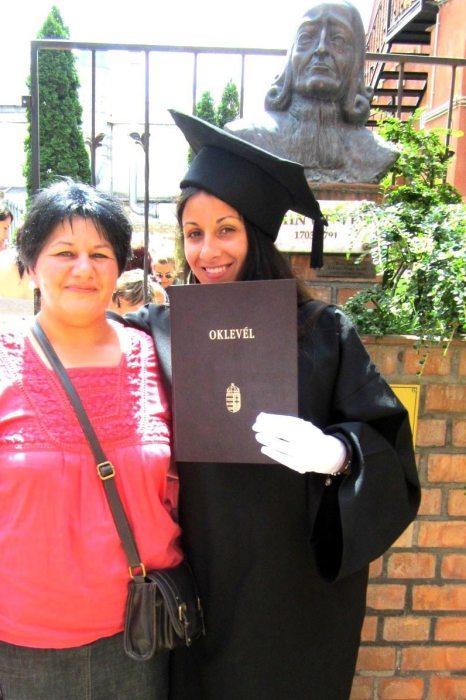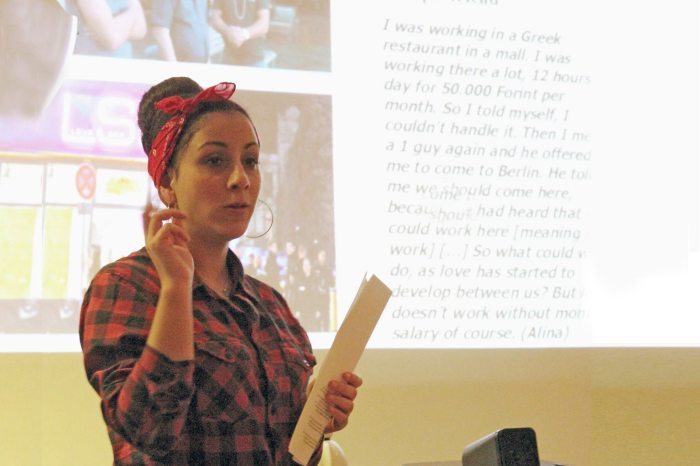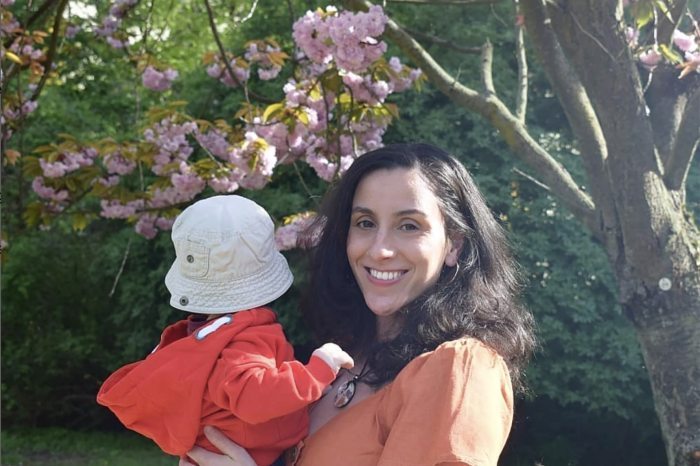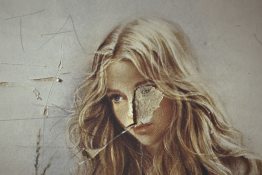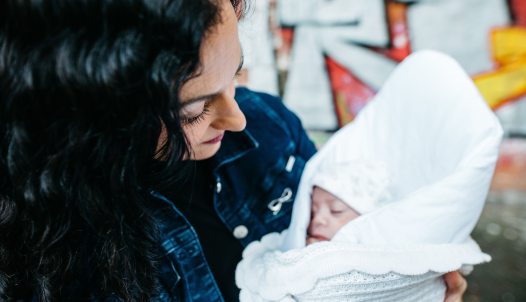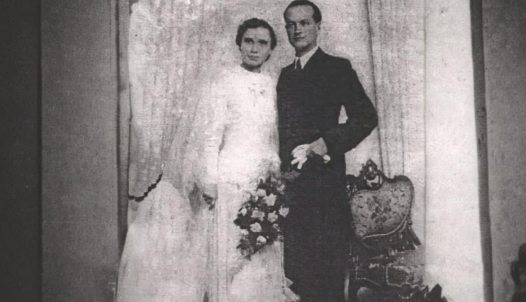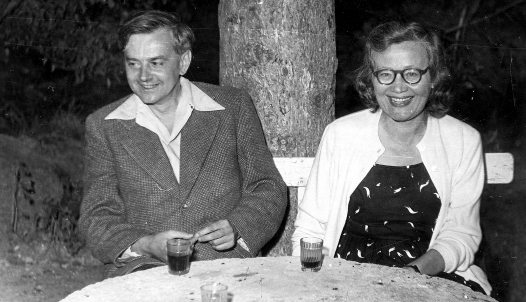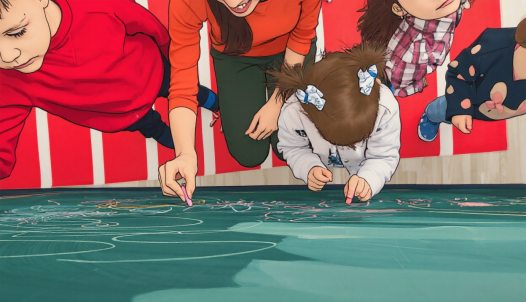The adventurous journey of Éva, a young Roma social worker from Tata to Berlin – "To be human in all circumstances"
Éva Ádám is a young woman who has seen so many touching human stories that a lifetime might not be enough to tell them all. As a social worker and special needs teacher, she is determined to help those who have been abandoned by many. She has worked with addicts and, as a Roma herself, for many years helped Hungarian Roma prostitutes in Berlin's most depressed 'red light' districts. She now gives talks in schools across Europe to educate young people about Roma culture and history. Évike, as most people call her, found her calling at an early age, but she has come a long way from Tata, where she grew up, to Berlin. Her mother brought her up alone in very humble circumstances, but for her, a difficult start was not an obstacle but a catalyst. Her story is a message: it is not circumstances that determine where we go. But where did she find the strength and perseverance to follow a path that no one in her family had done before her?
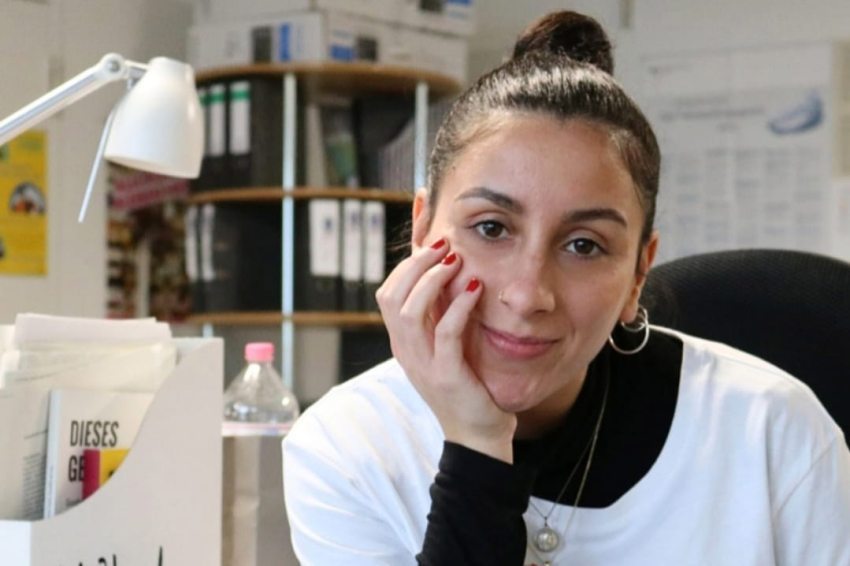
We've been friends for 15 years. I remember standing in line at the cafeteria of the Reformed High School in Tata, when you walked up to me, we didn’t know each other but complimented my hair. You have a kind word for everyone, and you always listen to others with attention and interest. Where does this receptivity come from?
It's a spiritual character trait, but I owe a lot to my mother, my childhood role models and perhaps also to adversity. My mother raised me as a single mom, on a cleaning lady's salary, in a small one-room apartment, yet I had a wonderful childhood. We spent a lot of time together and had an intimate relationship – and still do. The school years were not easy because the kids excluded me and often made mean remarks on my origins; I never understood why my classmates did that, because at home it was just natural that we were Roma. Despite all this, I never considered myself a victim.
I don't like the victim role, because it reinforces prejudice.
This start helped me to have a different perspective, I really appreciate what I got from my mother and everything we had.
You were the first in your family to get a diploma and a language certificate. You are a social worker and special needs teacher, you are fluent in German and speak English at an advanced level. What motivated you?
My mother supported and motivated me to study hard, set goals and achieve them. For me, she is the strongest person I know, because she sacrificed her whole life for me, and she is still doing everything for me and my son, living with us in Berlin. I am a single mother and my mother's presence means a lot. She has been through a lot of trials and tribulations, as she was only 15 years old when she was orphaned. She was never able to continue her studies because she had to work, and the hard physical work caused her to develop a number of chronic illnesses, which she still suffers from today. She raised me on a cleaning lady's salary, yet she gave me everything, I never felt short of anything.
Did you have any other role models?
Apart from my mother, I was helped on my way by exemplary people, who were truly great to me, such as Dr. Attila Kálmán, the late founder and former principal of the Reformed High School of Tata, my godmother, or my mother's primary school class teacher, Iza Körmendi, who followed and helped us throughout our lives. Their presence and love meant a lot. The words of Dr. Attila Kálmán are still with me today, his motto was "Soli Deo Gloria, to God alone be glory". He lived by this. He was not only my headmaster, my class teacher, my teacher, but also my greatest role model after my mother.
I miss such simple, ordinary, yet great people in today's world who are lights in their own communities.
Last but not least, of course, my faith in God was a big driving force.
How did you find your Roma identity?
Despite all the support, many people made me feel different. Apart from my family, I had no contact with other Roma people in Tata. This changed at college. I studied at Wesley John College of Ministry, in the eighth district in Budapest, where I had several Roma classmates. During those years, I won many scholarships: from Roma Veritas, Roma Education Fund, Cinka Panna Roma Cultural Association. Twice I was awarded a Republican scholarship, which had nothing to do with my Roma background – I earned it for my good academic performance. Later I was also awarded a scholarship to the Central European University Roma English Language program, where my classmates were all Romanian, Bulgarian and Ukrainian Roma. This was a very defining experience in my life and in strengthening my identity. I made lifelong friends there and gained a lot of knowledge and experience. Among other things, I met the girl who later referred me to Germany's largest organization for prostitutes and drug addicts, the Drogennotdienst. It was the first full-time job I ever had, working with Hungarian Roma prostitutes and drug addicts.
When I visited you in Berlin years ago, you showed me where you worked in the red light district. For me it was terrifying, I only saw the physical and mental misery and the heartbreaking life-stories of women. But you showed me around enthusiastically, introduced me to some of your clients, asked them how they were doing.Where did this passion come from, this calling to help those who are at their deepest?
I found my calling when I was 15. My German teacher, Eszter Bagdán, gave me a book by Teri Szűcs. The title is: Nobody is here by chance - stories of residents and staff from the KIMM drug center in Ráckeresztúr (‘Senki sincs itt véletlenül – lakók és munkatársak történetei a KIMM ráckeresztúri drogterápiás otthonból’). It is filled with the recovery stories of serious drug addicts who got clean through faith in God and therapy. Eight years later, I did my thesis on how deep faith in God helps people to quit. Besides my job as a social worker I did a year of volunteering in Germany that led me to become a special education teacher working with children with disabilities.
I'm really passionate about helping people, and I've taken as many opportunities as possible during my studies to gain practical knowledge.
I was an intern in the psychiatric unit of the Merényi Gusztáv Hospital, I had the opportunity to study with Dr. Gábor Zacher, I volunteered in several rehabs, women's programs and the Kékpont needle exchange.
At the beginning of your career you were not working with addicts, but provided low-threshold care for Hungarian prostitutes in Berlin. Why?
True, but there was a lot of overlap. I had a total of 120 street prostitute clients. Dr. Attila Kálmán always told me that the most important thing is to be human in all circumstances. That's essentially what I helped the girls with as a street social worker. I gave them condoms, accompanied them when they had abortions, translated, helped them deal with everyday things and listened to them. And the organization offered them a warm shelter. Since they were also involved in drug rehabilitation, I also participated in such a program as a therapist. I can proudly say that I also helped a German lady who had been a heroin addict since she was 12 years old to quit. She started taking drugs as a child in the infamous Zoo train station in West Berlin. The station, due to the failed German family policy of the time, was home to many homeless teenagers in a commune where, in addition to hard drug use, underage prostitution developed. This poignant story has been turned into a book by Christiane F. entitled Zoo Station, a memoire. It is a devastating account of Christiane's years at Zoo Station as a child. The story was later adapted into a film.
You have seen many difficult human fates, very few people can bear it. Was there anyone who had a big impact on you?
I could go on and on. There was a lot of atrocity among the mafia organisations from different nationalities organised on the streets.
Once a nine-month pregnant prostitute ran in with a knife in her back, but there was also a case when a conflict between Bulgarian and Hungarian girls ended with our office being sprayed with pepper spray.
Of course, besides the many difficult stories, there were also a few success ones: for example, a Hungarian girl who had worked as a prostitute for many years was turned to Christ. She gave up her life in Berlin and prostitution and moved back to Hungary to be with her family.
Besides, the work itself was special for me, a Hungarian Roma woman, because I could see women who had grown up in the Roma tradition – where virginity and early marriage are important values – but were forced into prostitution. When the Transylvanian Roma girl in a traditional skirt and headscarf came in for 100 condoms, I was shocked. Half an hour later, she showed up looking completely different, dressed in the clothes she needed for her job. It is very ambivalent to see when individual tradition clashes with prostitution.
Society stigmatises these women. How did you see them?
What I learned is that these girls are very strong. Without exception, they come from traumatised backgrounds. Most of them are undocumented and some are living on the streets. They also struggle with addictions: to their pimps, gambling or drugs.
I learned that in street prostitution there is no such thing as motivation, only coercion.
The majority of the girls are coming from orphanages and started sex work because of poverty, lack of prospects, unemployment, racism against Roma and lack of education or a good example.
How have you been able to cope emotionally with all the impact that your work has had on you?
Being able not to engage emotionally and be there as a professional is an important pillar of my profession. Of course, there have been times when I have taken a story with me for a short period of time. As a professional I am there to help make the difficulties more bearable. Supervision and faith in God help me to get through a difficult case.
You often mention faith as a source of strength in your life. What does that mean to you?
As the Word says, God is my fortress, my rock. An important resting place for me is prayer, silence. It gives me peace of mind to know that I have a Creator who has my best interests at heart, who cares for me. I often don't understand why things happen, what God's purpose is in my life with them, but faith in His promise that He will ultimately work everything for my good helps me to carry the burden of everyday life. Without Him, it would be much harder for me to cope with everything. He is like an oasis for me, an oasis where I can draw strength from whenever I need to, and where I can rest. It also means taking my hands off the things I have no control over and giving them to God.
You have been living in Germany for almost seven years. For more than two years, you have been working as the educational director of Amaro Drom, one of the largest German Roma organisations, to educate the younger generation about Roma culture and history, and to reduce prejudice in society towards minority communities. How do you now relate to your roots?
I am proud of being Hungarian and of my Roma origin. My Hungarian mother tongue and my culture are very important.
After all this time living abroad, I really understand what home is.
I love Tata very much and I often feel homesick. I have many dreams: I would like to continue my studies and become an addictologist, and I want to use my knowledge and experience for the benefit of Hungary and the Roma community back home. I believe I can give hope to many Roma young people like me by telling my story and encouraging them to dare to dream.
Who are the people who keep you going, away from home, in the challenges of life in a foreign country?
Besides my faith in God, I have my mother and my two and a half year old son, Nanu. It is touching for me to experience that God cares for me here, even though I have had many difficulties. Dr. Attila Kálmán lives only in my memories and in my heart, but I know a Hungarian lady here in Berlin who is very much like him, Dr. Marianna Katona S.. They are close in age, too. She is also an exemplary person of the old times, I have a very close relationship with her, I owe a lot to her. Soli Deo Gloria, truly to God alone be the glory for all things!
This article was written by the author as a master's thesis for the communication training course "Journalism in the 21st Century" at the Faludi Ferenc Jesuit Academy.
